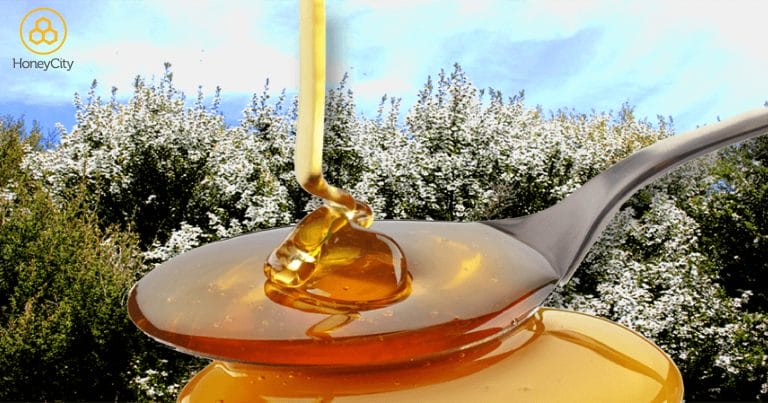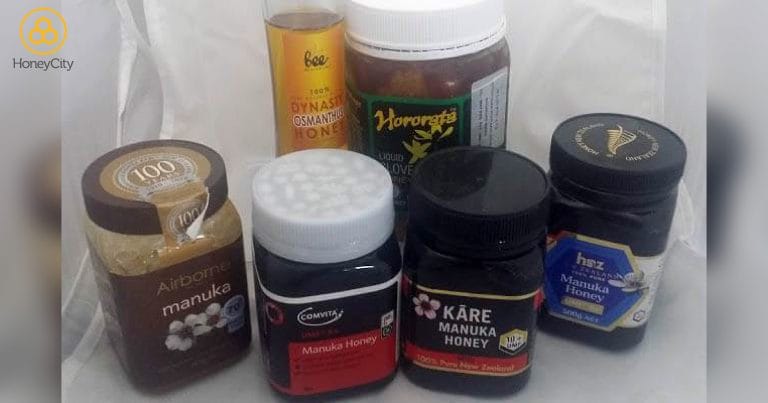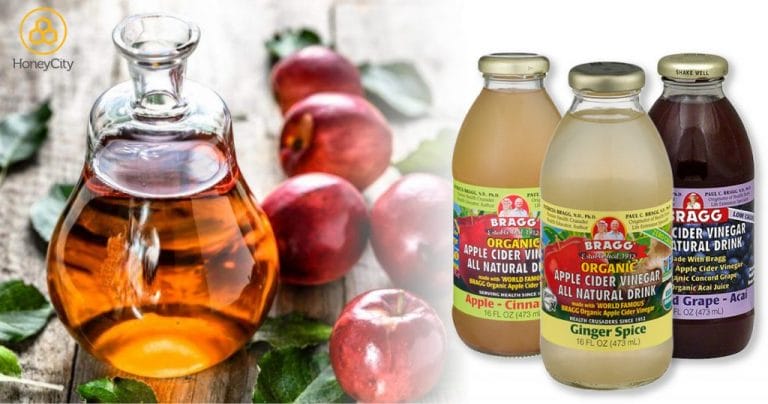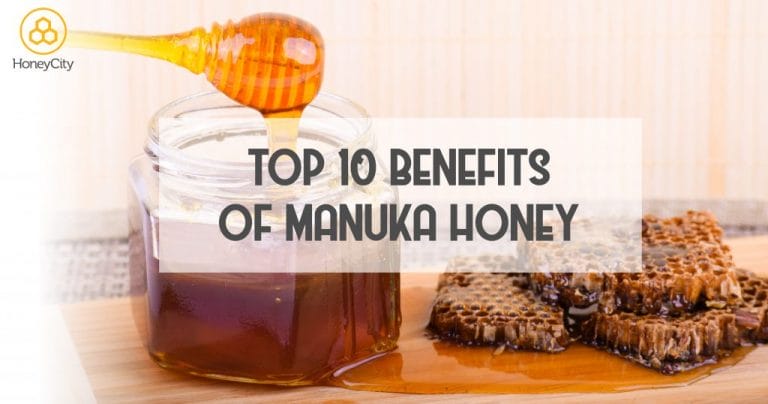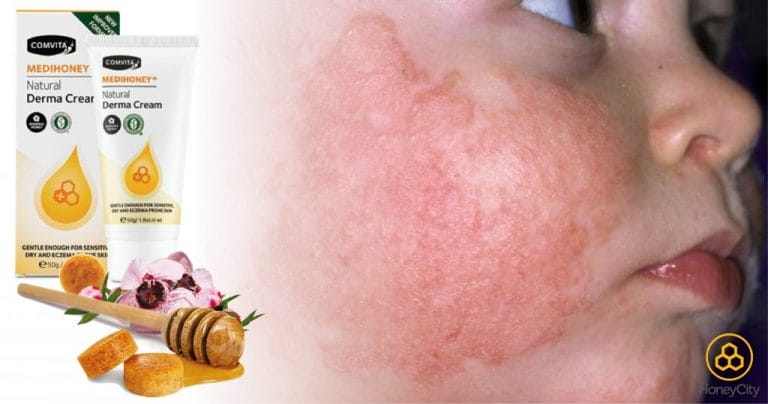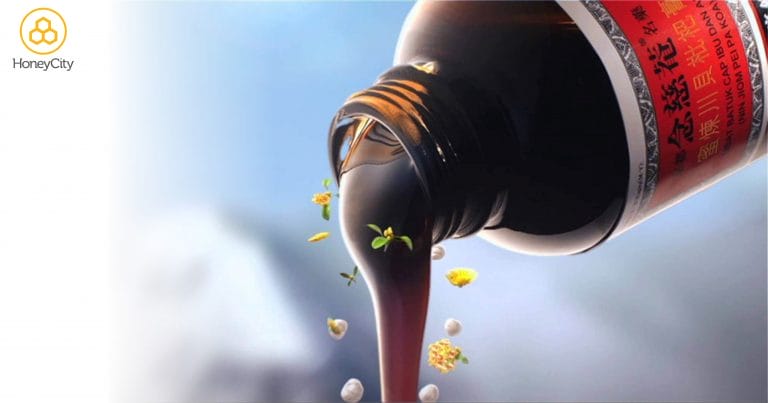Manuka Honey Benefits: All the Questions you have – FAQ
Manuka Honey – Frequently Asked Questions
When buying manuka honey, I am sure you would like to buy the best. Naturally, you will have a lot of questions that need to be answered.
Here, the questions floating in your mind will be answered once and for all. Read on to find out more.
What is Manuka Honey?
Manuka honey is known for beneficial to our health because of UMF (Unique Manuka Factor) content. It comes from manuka bush in New Zealand and has shown antibacterial properties.
It is a form of monofloral honey produced by bees that collect nectar from the flowers of the Manuka bush indigenous only to New Zealand and a tiny area off Australia. Manuka bush only grows in this specific climate zone, and the rich dark soil of New Zealand.
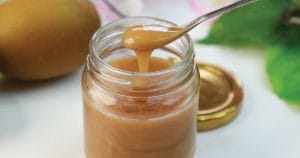 Worker bees then add an enzyme, glucose oxidase, to the nectar inside the hive in order to preserve the honey for storage and uses later. When manuka honey is eaten, the glucose oxidase enzyme will then slowly releases hydrogen peroxide, which is of anti-bacterial. The levels of hydrogen peroxide released are of a decent level to destroy bacteria but yet safe enough not to affect any of our human tissues,
Worker bees then add an enzyme, glucose oxidase, to the nectar inside the hive in order to preserve the honey for storage and uses later. When manuka honey is eaten, the glucose oxidase enzyme will then slowly releases hydrogen peroxide, which is of anti-bacterial. The levels of hydrogen peroxide released are of a decent level to destroy bacteria but yet safe enough not to affect any of our human tissues,
Studies on the Manuka Honey benefits have shown that Manuka Honey, a special type of mono-floral honey contains an ingredient with powerful antibacterial, antimicrobial, antiviral, antioxidant, antiseptic, anti-inflammatory and antifungal properties. This ingredient was originally named UMF® (Unique Manuka Factor).
What are the Components Of Manuka Honey?
Manuka honey is rich in hydrogen peroxide, a compound strong in antibiotics quality. It also contains methylglyoxal (MG) and dihydroxyacetone that are antibacterial. MG is a compound found in most other types of honey, but usually only in small quantities.
In manuka honey, MG comes from the conversion of another compound — dihydroxyacetone — that is found in high concentration in the nectar of manuka flowers. MG is thought to give manuka honey some of its antibacterial power. The higher the concentration of MG, the stronger the antibiotic effect. But, there may also be other compounds involved in the medicinal effect of manuka honey.
Manuka honey contains up to 100 times more MG (methylglyoxal) than the normal honey found elsewhere.
What is methylglyoxal (MG) in manuka honey?
Methylglyoxal is an antibacterial component found in most honey. Scientific lab tests have verified that MG is able to kill bacterias and super-bugs.
- Helicobacter pylori (i.e. H. pylori): Causes stomach ulcers and “leaky gut” syndrome
- Staphylococcus aureus (i.e. staph infection) and MRSA: These are the “super-bugs” doctors have feared for their resistance to modern antibiotics
- E. Coli: Causes serious food poisoning
- Streptococcus pyogenes (i.e. strep throat): Causes strep throat
Honey producers have developed a scale for rating the potency of manuka honey. The rating is called UMF, which stands for Unique Manuka Factor, standards are set by the UMF Board.
The UMF rating is thought to correspond with the concentration of MG and other compounds. Not all honey labeled as manuka honey contains significant levels of antibacterial factors. To be considered potent enough to be therapeutic, manuka honey needs a minimum rating of 10 UMF. Honey at or above that level is marketed as “UMF Manuka Honey”.
What are the Uses Of Manuka Honey?
You can use Manuka honey for a variety of uses, both internally and externally. Some problems Manuka solves include diarrhea, sore throats and eczema.
Internal Uses
- Poor Immune System
- Stomach Ulcer
- Stomach Pain
- Gum Disease
- Acid Reflux Disease
- Aches and Pains
- Arthritis
- Heartburn
- Diarrhea
- Constipation
- A sore throat
- Poor health
- Get Sick Easily
- Improves Sleep
 Manuka Honey Uses and Benefits
Manuka Honey Uses and Benefits
External Uses
- Athlete’s Foot
- Ring Worm
- Insect Bites
- Acne and Rosacea
- Eczema and Dermatitis
- Rashes
- MRS/ Staph Infections
- Chronic Wounds
- Pressure Sores
- Surgical Wounds
- Psoriasis
- Cold Sores
- Candida Albicans
- Burns
- Nail Fungus
- Skin Ulcers
Does Real Manuka Honey Attract Ants?
Yes, ants do get attracted to manuka honey and all other honey too.
Ants are attracted to moisture, not the sugar content. The more the water content in the honey the higher the chance of it attracting ants. This is because ants are attracted to moisture.
Some claim that only fake “honey” that is actually sugary syrup attracts ants while real honey does not. This creates the myth of manuka honey that attracts ants are fakes.
In the wild, nectar and raw honey does indeed attract ants due to the high moisture levels in the honey.
Real Honey Has Low Water Content
Sugary syrups attracts ants more than real honey, as sugary syrups contain more moisture. There are some brands of honey (especially honey from dishonest sellers/producers) that has water added to increase the weight, hence diluting the natural honey.
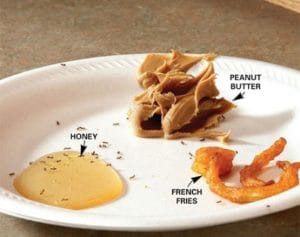 honey does attract ants due to some moisture content
honey does attract ants due to some moisture content
Pure honey has a moisture content of less than 20%. High-quality Manuka has even less.
All honey do draw moisture from the air, so manuka honey exposed to the air will draw moisture. This will then eventually attracts ants to the honey. (Side note: Manuka honey absorbs moisture very well. This is why manuka honey is such a terrific skin care product as it draws moisture to the skin that is applied on)
Absorption of moisture happens even faster in a humid environment like Hong Kong or other tropical areas like Florida etc.
How Does Manuka Honey Benefit Skin?
We know that manuka honey provides nutrient for smooth skins, but not many people know that it can be applied directly to the skin to moisturise and renew our skin!
Celebrities such as Scarlett Johansson use Manuka as a face mask as well.
 Scarlett Johansson is big fan of manuka honey
Scarlett Johansson is big fan of manuka honey
Why Is Manuka Honey So Beneficial To Skin
Traditional and modern medicine has been using manuka honey for its natural antibacterial properties. They can kill bacteria on our skin that could cause acne or other skin problems.
Manuka Honey Benefits For Skin By Eating Or Application
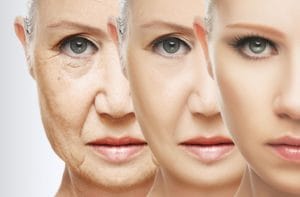 Manuka Honey Anti Aging
Manuka Honey Anti Aging
Anti-aging:
Manuka honey is able to retain moisture without making skin oily. This is an important condition in cultivating wrinkle-free skin. Manuka honey also helps in anti-aging by inhibiting a group of enzymes that destroys collagen which is necessary for healthy skin.
MG has been shown to promote the structural growth of collagen in skin cells. Manuka also contains amino acids that build up collagen. A healthy level of collagen means clear, firm, healthy, youthful-looking skin.
Repairs and Clears Skin:
It has been lab proven that manuka honey repairs skin cellular damage, lessens scarring and promotes skin regeneration. Manuka helps blemished skin because of its natural antibacterial properties.
It contains potent anti-inflammatory properties that soothe inflamed skin while healing blemishes. Manuka also balances the skin’s pH and its amino acids help clear dead skin cells, helping to keep pores clear.
Heals Pimples/Acne:
Manuka honey oxygenates pores and draw out bacteria, improving the skin condition of acne sensitive zones. This reduces pimples and acne occurrences.
It also has anti-inflammatory properties that fight acne and reduces redness. Manuka also manages and heals inflamed or congested skin and eczema.
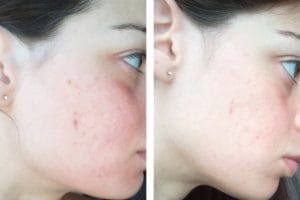 Facial manuka honey Before and After
Facial manuka honey Before and After
Hydration:
Manuka honey naturally draws and retains moisture into the skin. This natural hydration helps to further enhance the skin’s elasticity and cell regeneration, as well as promote skin cell healing.
Hence, this will hydrate your skin and provides a glowing complexion.
What are the skin treatments I can use manuka honey for?
- Manuka calms and heals skin conditions such as eczema and psoriasis itching.
- It heals pimples/acne and prevents acne bacteria from returning
- It reduces redness and itchiness on sensitive skin
- Manuka can cure anti-fungal skin infections like athlete’s foot or yeast infections.
- It has been proven supportive of curing harmful skin infections such as staph or MRSA.
- Medical grade manuka helps to soothe burns and improve healing times.
- Medical grade manuka also eases wounds and skin cuts infection rates and heal them faster.
- It helps in scars healing.
- Manuka helps maintains a balance of healthy bacteria and keeps harmful bacteria from your skin
- Manuka gives an overall healthy glow to your skin.
How To Use Manuka Honey Face Mask
Just use manuka honey from the jar on its own!
After washing and gently exfoliating your face, pat dry with a towel and apply a very thin layer of manuka honey. Leave the honey on your face for at least 30 minutes, then wash it off with water.
 Manuka Honey face mask
Manuka Honey face mask
You can use honey in some facial treatments way:
Cinnamon Mask:
1) Use hot water to steam your skin. Be careful not to hurt by the hot water.
2) You should use a clean towel to pat dry.
3) Mix manuka honey with cinnamon. Apply a thin layer of this mixture on your face.
4) Leave it on your face for 20 minutes. Gently wipe off and rinse with cold water, this will close your facial pores.
You may also use the same mixture as a facial spot treatment and leave on overnight to heal.
Cleanser: Add a few drops of hot water to a teaspoon sized portion of manuka and cleanse massage around your entire face for 3 minutes. Then, gently wipe off with a facial cloth or sponge for extra exfoliation.
Acne Scars/Dark spot treatment: To fade dark spots or acne scars, you can brighten and heal your skin. Mix lemon juices, a teaspoon of cane sugar and a teaspoon of manuka. After that, use hot water to steam your skin, pad dry and massage this mixture in the facial zone and leave it on for 20 minutes. Following that, use cold water to rinse and close your pores.
Where Can I Get Manuka Skin Products?
You may buy Manuka honey that is UMF-certified for authentic manuka honey, to eat daily, or to apply on your skin.
If you do not like to DIY and prefer manuka honey-based skin care products, there is 1 product that Kate Middleton(member of the Royal family of Great Britain) uses for her skin care – Royal Nectar Manuka honey Skin Care.
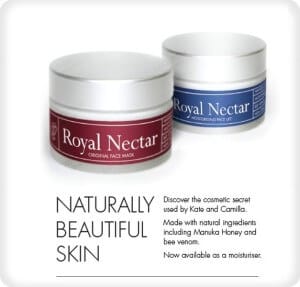 Royal Nectar Original Face Mask
Royal Nectar Original Face Mask
Is manuka honey good for eczema?
For many adult and child eczema, it can be manageable with ointments or cream.
A study of eczema sufferers that underwent application of honey, beeswax and olive oil for 2 weeks found that 8 out of 10 cases have experienced significant improvements in their conditions.
Applying manuka honey helps eczema patients in these ways:
- The skin barrier for eczema sufferers is weaker, so manuka honey helps to create extra barrier protection to prevent infection.
- The skin retains moisture and reduce incidents of eczema flare-up.
- Manuka honey has bacteria fighting properties that combat staphlococcus and other topical infection.
- Inflammation is reduced.
- Broken skin, dry, flaky, cracked skin are all common wound that can be healed much faster.
You can apply topically or also consume it orally for the nutrients to boost your immune system.
For those with eczema-prone skin, you may wish to consider natural Comvita Medihoney Eczema derma cream
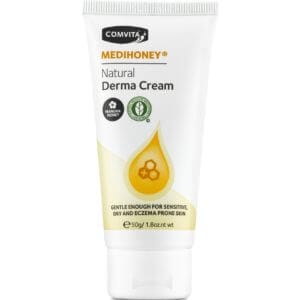 Comvita Medihoney Natural Derma Cream Eczema 50g
Comvita Medihoney Natural Derma Cream Eczema 50g
Is Honey Fattening?
Honey is not fattening in moderation. However, since honey is a type of sugar, it is fattening if consumed in excess.
One tablespoon of honey contains 68 calories. This equals to around 20 minutes in a gym for strength training to burn off. Hence, it is obvious as to why honey should be taken in moderation. Although it may taste delicious, everything should be consumed in moderation. However, if you have a sweet tooth, honey is a better alternative to sugar. Replacing sugar in your drinks and food with honey will pay dividends to your health in the long run.
Is Manuka Honey Vegan?
Honey is not a meat product of any animal or insects, so those vegetarians who do not eat meat products may consume honey just like milk or egg. Bee produce honey in excess of what they need to consume to grow, so this surplus are harvested by beekeepers.
Vegans who are stricter may not want to consume honey. Veganism is defined to be a way of living without the exploitation of any organism in the animal kingdom. Some view bees as animals and they are used to make honey. In most cases, the honey is made from honey farms where bees are bred solely for the production of honey. Hence, some may argue that honey is not vegan.
Is Manuka Honey Pasteurized?
Manuka honey is different as it produces a unique substance that is antibacterial.
Most commercial honey is pasteurized. This is to remove all bacteria and potentially dangerous toxins in the honey. However, in normal honey, this may decrease its beneficial properties. Most scientific studies show commercial pasteurized honey to be as beneficial as raw honey.
There some who prefer organic or raw honey that is not pasteurized.
Is Manuka Honey Good For Diabetics?
No. If you are overweight or diabetic, try to avoid all forms of sugar. Obviously, honey is a form of sugar and hence should be avoided as much as possible.
However, if absolutely necessary, honey is a lesser evil compared to sugar. Sugar is just 100% sucrose with no other nutritional benefits. However, honey has nutrients and minerals that help to boost the body’s health. Both sugar and honey will spike blood sugar levels but honey will cause the levels to return to normal quicker. Hence, if you really need something sweet, it is recommended to take honey.
Is Manuka Honey Good For Dogs?
Honey may not be good for eating due to its high sugar content. However, applying honey to your dog’s cuts or wounds will help kill bacteria and heal the wound faster.
Honey can be used to cure kennel cough. Feeding your dog 1/2 a teaspoon of honey 3 to 4 times a day would usually do the trick. Furthermore, just like humans, do not feed dogs under a year old honey. This is because honey may contain bacteria that your dog is not ready to fight off. Also, if your dog is overweight or diabetic, it would be advised that you seek out a vet’s opinion before feeding him honey.
What is the Nutrition value of Manuka Honey?
Regular honey is known and eaten regularly for it’s tremendous nutritional and immune-boosting abilities. There are natural minerals and vitamins which metabolize undesirable cholesterol and fatty acid, hence preventing obesity and promoting better health.
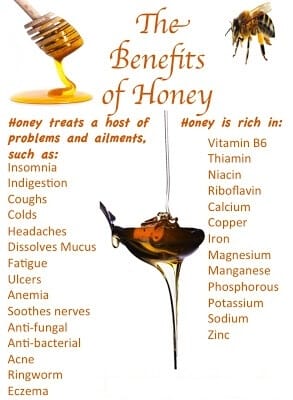 Benefits of Honey
Benefits of Honey
Honey has a healthy Glycemic Index (GI), meaning that its sugars can be gradually absorbed into the bloodstream to result in better digestion. Hence we should try to avoid eating excessive high-glycemic foods which would prompt an elevated insulin release in our body as a result of the pancreas being stimulated to metabolize the sudden surge of glucose into the blood.
Furthermore, Manuka honey has an even richer nutritional profile of numerous minerals and vitamins.
- Anti-oxidants
- Amino acids
- Calcium
- Copper
- Iron
- Magnesium
- Manganese
- Phosphorus
- Potassium
- Sodium
- Zinc
- Vitamins B (B6, thiamin, niacin, riboflavin, pantothenic acid)
Manuka Honey is also totally free of fats and cholesterols!
The nutritional content of manuka honey is up to 4 times that of normal flower honey.
Manuka honey also contains an ingredient with powerful antibacterial, antimicrobial, antiviral, antioxidant, antiseptic, anti-inflammatory and antifungal properties. This is known as the Unique Manuka Factor. (UMF)
How To Store Honey or Manuka Honey?
We should store honey in the original bottle in a dry and cool place that is out of direct sunlight.
Honey is anti-bacterial and has a long shelf life without the need to be refrigerated. Also, there is no need to refrigerate honey as it can be stored at room temperature.
 Store honey in cool dry place
Store honey in cool dry place
Avoid refrigeration to prevent crystallization of the honey. Crystallization is the natural process of glucose sugar molecules aligning into orderly arrangements known as crystals. However, do not worry as crystallization is not an indicator of spoilage, impurity, age or quality. This can be reversed by leaving the honey at room temperature overnight.
Always keep your honey in its original bottles, either in glass or high-quality plastic, in your kitchen cabinets or shelves.
Make sure your manuka honey is labeled UMF, as the UMF association would usually demand high-quality plastic/glass containers to ensure that the manuka properties are maintained.
Does Honey Have An Expiration Date?
Honey does not spoil and neither does it rot. The expiration date on honey is usually to fulfill legal obligations.
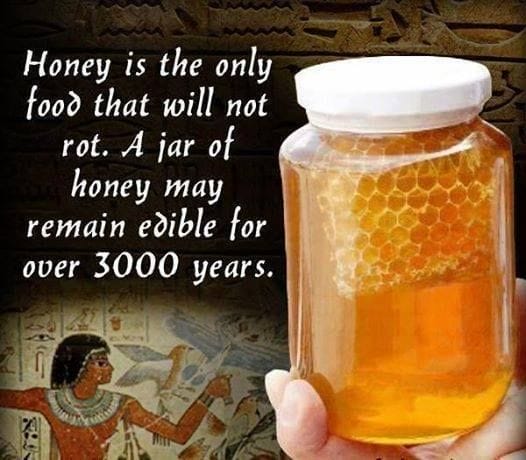 Honey does not spoil
Honey does not spoil
They found many ancient pots of honey, made thousands of years ago and they are all edible.
Modern government food regulations have a maximum of 5 years expiry date from the date of production. Hence even though scientific evidence points out that manuka honey does not spoil, they still put a 5-year expiry date on all honey.
How Do You Eat Manuka Properly?
Take 1 tablespoon 2-3 times a day, before meals. Eat the honey directly from the spoon without mixing into a drink for best effects. Premium manuka honey does not taste too sweet, some have a bitter taste on it.
You may like to drink some water after that to wash down the honey.
Some premium manuka honey like Comvita and Kare manuka have a bitter aftertaste, while some brands like Taku manuka honey is more sweet and popular with children.
However, Manuka honey is usually thicker and takes a longer time to mix with water than normal honey. Thus, you should just scoop it up and eat it.
Can I Use A Metal Spoon Or Wooden Spoon Dipper For Honey?
You do not have to use a wooden or ceramic spoon for honey, any type of spoon is fine. The rumour that using a metal spoon will spoil honey is purely a myth.
People usually suggest not to use a metal spoon as honey has an acidic pH and it may react with a metallic surface. Hence, this reaction may damage and reduce the healing properties of honey.
Frankly, most beekeepers and professionals know that using a metal spoon is acceptable. You are simply scooping the honey out and thus the metal will only contact the honey for a short period of time. This has negligible effects. However, it is a big no-no to leave a metal spoon in a jar of honey overnight.
 manuka honey uses
manuka honey uses
If you are really insistent on using a non-metal spoon to eat honey correctly, you can just stick to using any wooden, ceramic, or plastic spoons.
Mixing Honey Into Drinks For Children
For the children, you can mix it as a drink for the kids. Mix with room temperature, cold or warm water (not too hot), however, remember that hot water will damage the enzymes and nutrients within the honey.
You could also try mixing it with toast or crackers for breakfast or snacks.
When Can My Baby Eat Honey?
Children can eat honey when they are at least 12 months old.
Honey naturally contains the spores of the bacterium Clostridium botulinum. However, this does not mean the honey is contaminated. It is natural and harmless to almost all adults and children. Unfortunately, a baby below 12 months old has not developed his digestive and immune system well and can suffer from ill effects of the bacteria spores- botulism. Honey may cause them sickness or even death. Hence, to reduce such risks, it is best to avoid giving any honey to babies. Babies below 1-year-old should avoid all honey, even “pasteurized” honey as traces of botulism bacteria may still exist.
How to take Apple Cider Vinegar and Honey?
- You can mix 1 teaspoon of apple cider viengar (0.17oz / 5ml) with 1 teaspoon of honey into a glass of water (8 oz / 240ml)
- Drink at least once in the morning and once in the evening.
What is UMF ® (Unique Manuka Factor)?
UMF is a quality trademark and grading system for honey. The higher the UMF the stronger and higher quality the honey. High UMF means that the honey is more potent and has more nutrients within.
Warning: Do NOT confuse active manuka honey UMF 20+ or MGO 400+ (any numbers) with Active Manuka Honey 20+ (any number). If the honey is not labeled with UMF or MGO, you are buying normal honey.
It is to be noted that not all Manuka Honey has UMF® and that not every level of UMF® have antibacterial, antiviral or antiseptic benefits. Hence, the higher the UMF® level, the higher the health benefits of Manuka Honey.
Researchers have proven that Manuka Honey is one of the strongest bacteria killers even when diluted 10 times. Thus, Manuka Honey is recommended for people with weak immune systems.
How Do I Interpret The Grading?
Generally speaking, any manuka honey with a UMF above 16 is considered to be of high quality with plenty of benefits. UMF 5 to 9 is considered low grade while UMF 10 to 15 is medium.
Hence, if you wish to buy high-quality manuka honey, remember to look at the UMF of each honey.
Why Is UMF Only In Some Honey?
The manuka bush where manuka honey is harvested from only grows in specific places. Furthermore, this bush does not produce honey with the specific property year round. For this reason, not all honey harvested has a UMF rating.
The special property comes from an enzyme within the manuka bush flower. This enzyme is not produced in the flowers year round and it is dependent on the seasons of the country. Many have speculated that this enzyme could be due to environmental factors such as soil type or the weather.
How Is UMF Graded?

The UMF grading system appraises natural markers found in Manuka honey and assures purity & quality. This is compliant with the recent interim labeling guidelines published by the Ministry for Primary Industries.
The UMF grading system has two components which are expressed on any UMF licensed honey product:
- The label claim that it is Manuka
- The number – this represents three chemical markers that indicate the content of this honey to ensure purity and quality.
Which UMF Is Suitable For Me?
Most healthy individuals would find UMF 10+ Manuka honey ideal and effective in immune boosting.
Manuka Honey with a UMF of less than 10 has a low level of activity and may not be effective for some medical conditions. The ideal potency is between UMF 10 and 18.
You may use the below as a guide.
UMF 5+: To test the textures, tastes, and suitability. You can eat daily as it is very affordable.
UMF 10+: To boost healthy individual’s immunity system. Taken daily for maintenance of good health. Most people buy UMF10+ as it is usually the most common and it is enough to maintain our good health.
UMF 15+: For those who may be weak and fall sick easily. For those with bad health problems such as gastric, this is more potent and suitable for you.
UMF 20+: For those with serious gastric problems, or health issues. Due to tight production difficulties, this UMF 20+ is extremely expensive and usually out of stock. If you do need this, please email us (info@honeycity.com.sg) directly to request for pre-orders. Some people have experienced sensitivity to Manuka Honey with a UMF 20 and above.
UMF® HONEY ASSOCIATION LICENSEES

UMFHA has more than 67 companies licensed to use the UMF® trademark.
Only organizations with a license are allowed to use the UMF® trademark.
HoneyCity distributes these registered licensees of UMF® Manuka honey.
| License # | New Zealand Company | Website |
| 1019 | Comvita New Zealand Limited | www.comvita.com |
| 1098 | Taku Honey | www.takuhoney.com |
| 2202 | Kare Ltd | www.kare.co.nz |
|
2252 |
Onuku Ltd | http://www.umf.org.nz/portfolio/onuku-ltd/ |
How do I know manuka honey is real and genuine?
More 80% of manuka honey sold globally are fakes. New Zealand only produces 1700 tons of manuka honey annually, but globaly more than 10,000 tons are sold! This means most manuka honey are fraudulently labelled and sold. Most likely the cheap manuka honey you got at a bargain are just plain honey, or worse, sugar syrup with thickener and chemical added.

Please do ensure you buy from speciality stores that import from New Zealand directly, as most distributors and supermarkets are not even aware the “manuka honey” they sold are fake. And do trust UMF registered trademarks, they are enforced by the New Zealand government to protect the authenticity of real manuka honey.
HoneyCity imports only high-quality UMF® manuka honey directly from New Zealand farms.

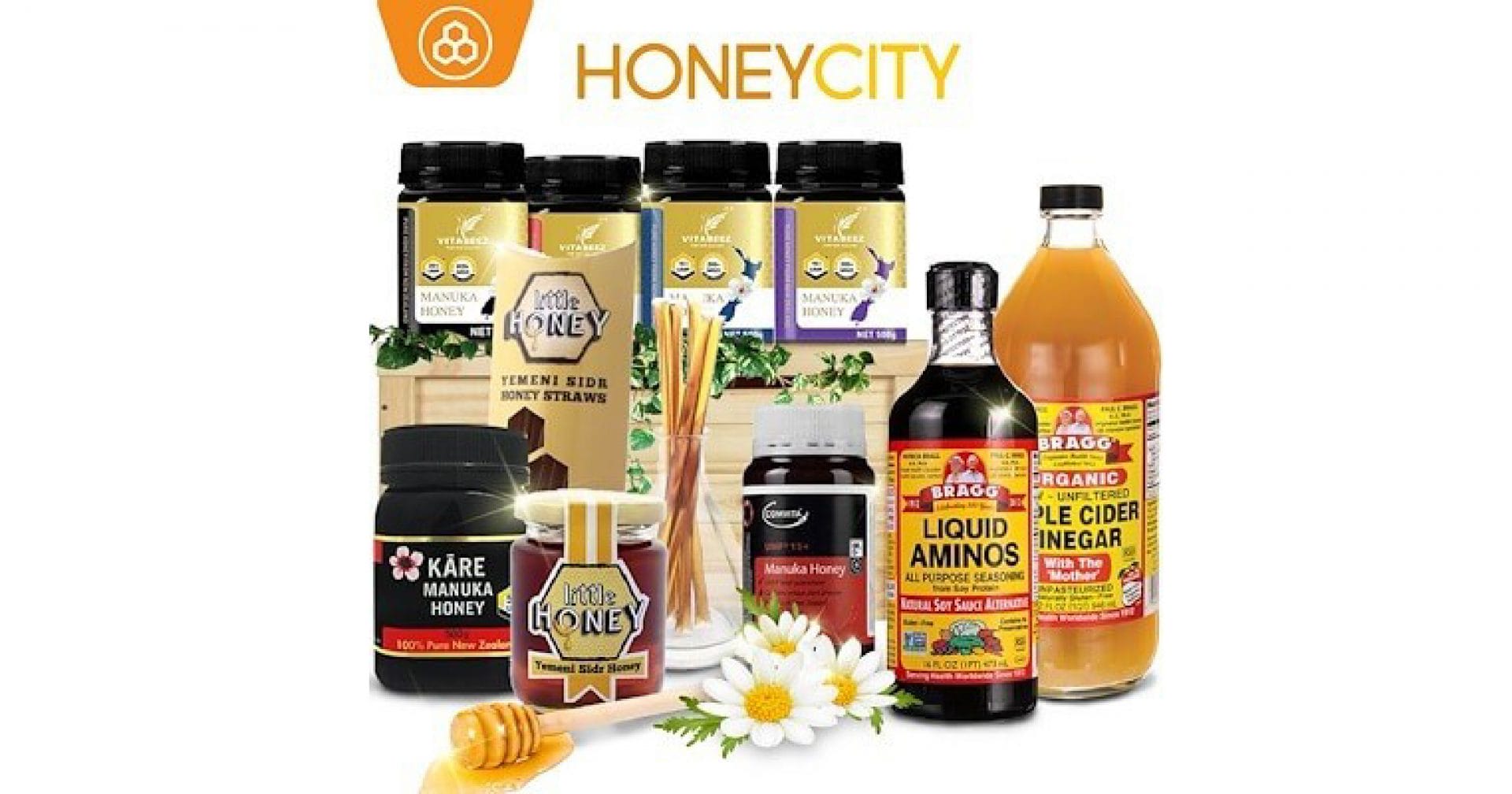
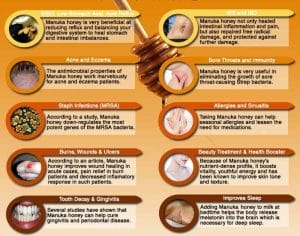 Manuka Honey Uses and Benefits
Manuka Honey Uses and Benefits